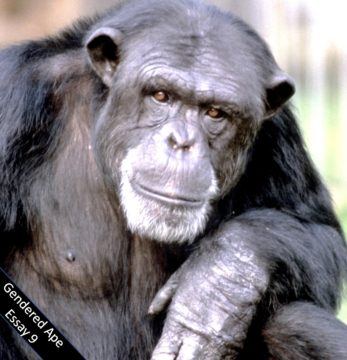Editor’s Note: Frans de Waal’s new book, Different: Gender Through the Eyes of a Primatologist, has generated some controversy and misunderstanding. He will address these issues in a series of short essays which will be published at 3QD and can all be seen in one place here. More comments on these essays can also be seen at Frans de Waal’s Facebook page.
by Frans de Waal

In my study of power among chimpanzees, I was inspired by Niccolò Machiavelli’s “The Prince,” a book from half a millennium ago, which famously declared that “it’s better to be feared than loved if you cannot be both.”
But let’s not forget that for a leader it’s better to be respected than feared. Respect is easily combined with love. Fear is, in fact, for the untalented ruler, the one who needs to beat everyone over the head to get them to do what he wants. It’s for bullies and despots.
Nonetheless, visit any businessbook section and you’ll find a plethora of how-to books on alpha males that perpetuate the notion that they thrive on fear. Here two recent titles:
- Dominic Mann (2017). “How to Be an Alpha Male, Dominate in Both the Boardroom and Bedroom, and Live the Life of a Complete Badass.”
- Jack Landry (2015). “Alpha Male Bible: Become Legendary, A Lion Amongst Sheep.”
These books glorify the alpha concept, borrowed from wolf and primate research, with little mention of the skills that set a good alpha apart, such as generosity, impartiality, and shielding of the underdog. We’re presented with a cardboard version of leadership.
I find this all the more galling given the role of my book “Chimpanzee Politics” (1982) has played in the alpha concept’s popularity. My book drew the attention of U.S. Speaker of the House, Newt Gingrich, who put it on the reading list of Members of Congress. Since then, the “alpha male” label gained currency in Washington, DC, for politicians who dominate and intimidate.
When primatologists speak of alpha males and females, however, they’re not referencing any type of personality. The label simply indicates the individual at the top of the dominance hierarchy. Each group has one, and only one, alpha of each gender. Since there is far less competition between than within the genders, the alpha male and alpha female coexist. There’s no need to choose between them. In fact, they often form a team, reinforcing each other.
I know alpha males who have become extremely popular — loved even – since they brought security and unity to the group, and showed great empathy towards anyone defeated or injured. Their most conspicuous role was to step in when a fight occurred and restore order.
For example, a quarrel between two females spins out of control and ends with hair flying. Other apes rush up to join the fray. A knot of fighting, screaming apes rolls around, until the alpha male leaps in and beats them apart. He does not choose sides, like everybody else. Instead, anyone who continues to fight will receive a blow. Or he strides in between two screaming parties and stands there imposingly with all his hair on end, sometimes stretching out both arms in a beseeching gesture, making it clear that they will have to push him out of the way to continue.
In pigtail macaques, males perform a similar policing role. Once, at the Yerkes Field Station, my graduate student Jessica Flack and I kept three top males out of a large troop for one day at a time. During those days, we measured less play and more fights. The fights were also more serious and less often followed by reconciliation. The only way to restore stability was to return these males to the troop. Dominant males contribute to social harmony and are essential to keeping a troop together.
This doesn’t apply to every alpha male, though. As in humans, bullies may also reach the top. They are the leaders who need to follow Machiavelli’s rule. It’s a risky strategy, though. In both captive and wild chimpanzees, there are observations of bully alpha males ending badly. The community is waiting to throw its weight behind any viable challenge to their position in order to force them out, sometimes brutally killing them in the process.
In my experience, the typical alpha male is not like this. He is loved and respected so that when he loses his position to a younger male — which he always does at some point — he just steps down a few rungs on the social ladder without much drama. He lives out his life more relaxed, politicking in the background, grooming with his buddies and female friends, and gently roughhousing with the young like any good grandpa.
***
FURTHER READING
TED talk on primate alpha males: https://www.youtube.com/watch?v=BPsSKKL8N0s
Gendered Ape Essay #2 on female dominance & power.
Flack et al. (2005). Robustness mechanisms in primate societies: A perturbation study. Proc. Royal Society London B 272: 1091-1099.
For further details and references to the literature, read “Different: Gender Through the Eyes of a Primatologist” (Norton, 2022). A video about the book can be seen here: https://fb.watch/ffbauZBzNb/
